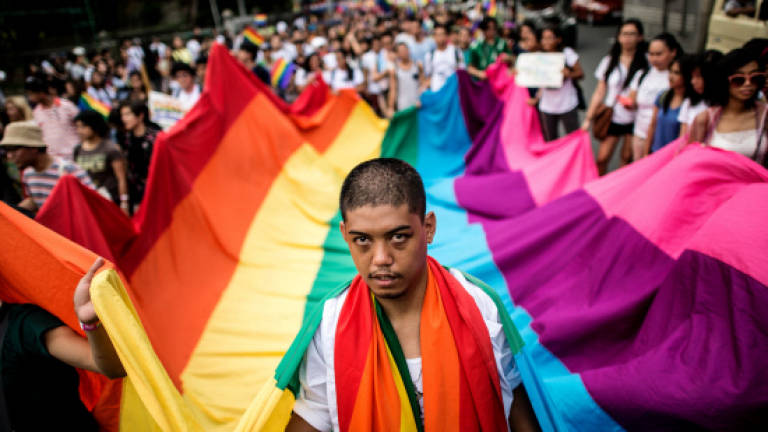Cuba's new leader brings hope for gay rights

HAVANA: Gay rights in Cuba have come a long way since the early years of the Communist revolution when countless people were marginalized or forced to flee because of their sexual orientation.
Now, the island's LGBT community is pinning its hopes on new leader Miguel Diaz-Canel to fight their corner in the battle for equal rights – with same-sex unions the ultimate goal.
The first Cuban president from outside the Castro family in over 40 years, Diaz-Canel was groomed within the Communist Party and was little known to the wider world before he assumed top office last month.
At home, however, the 58-year-old is known for having signalled support for the LGBT community when he was a provincial secretary for the party.
"He showed a sensitivity on the topic when he was leading the party" in the central Villa Clara province, Francisco Rodriguez, a journalist, Communist Party activist, and gay rights campaigner, told AFP.
Rodriguez – who goes by the nickname "Paquito" – said Diaz-Canel had been strongly supportive of a cultural centre in Villa Clara called El Mejunje, known as a haven for the local LGBT community.
Installed in the ruins of an old hotel, El Mejunje – which means "The Mixture" – was the only venue in Cuba to host drag performances back in the 1990s.
Cuba has a troubled history when it comes to gay rights: after Fidel Castro's revolutionaries came to power in 1959, gay people were stigmatized, and many were rounded up by police or forced into re-education camps.
Socially marginalized and barred from public jobs, many LGBT intellectuals and artists were forced to flee the country in the 1960s, 1970s, and 1980s.
By the early 2000s, however, the tide had started to turn, and a watershed came in 2010 when Fidel Castro – in a rare instance of self-criticism – admitted responsibility for the "injustices" perpetrated against homosexuals.
Raul and Mariela
After Fidel's brother Raul took over the presidency in 2008, Raul's daughter Mariela Castro became a powerful advocate for gay rights as the head of the government-funded National Center for Sex Education, Cenesex – fighting against political discrimination towards the LGBT community, and in favour of marriage equality.
The lawmaker credits her late mother, Raul Castro's wife Vilma Espin, for making the first efforts to change the status quo by raising awareness of the issue among the party's younger generation – which included a youthful Diaz-Canel.
Today, Mariela Castro maintains that her father has been quietly supportive of gay rights.
"What he did as the first secretary of the Communist Party and as president... was to cautiously lead the way towards a new consensus," she said.
She expects Diaz-Canel to pick up where her father left off.
In launching the 11th annual campaign against homophobia and transphobia – ushered in earlier this month with a colourful parade through the streets of Havana – Mariela Castro highlighted Diaz-Canel's track record of working with Cenesex, ever since his days as a party youth activist.
Same-sex marriage?
LGBT rights in Cuba have evolved by leaps and bounds in recent years, from the army opening up its ranks to gay soldiers, to the state covering the costs of gender reassignment surgery.
In 2012 a transgender woman became the first to win municipal office, as a city councillor in Caibarien, in Villa Clara province.
But while the Communist Party now officially bans employment discrimination based on sexual orientation, same-sex civil unions remain beyond reach, in spite of Catholicism being less prevalent in Cuba than other parts of Latin America.
Obtaining legal recognition for same-sex marriage is now the main goal of Cuba's gay rights movement today.
"It's not just about sex and nightlife – we have the right to have a family," Alex Duchel, a 37-year-old restaurant worker, told AFP at the march.
Rodriguez has high hopes that Diaz-Canel will take things further by being the first Cuban president to openly acknowledge and address the LGBT community, and the challenges it faces, in his speeches.
Diaz-Canel was not at Mariela Castro's side for the annual march against homophobia on May 14. However his musician children Jenny and Miguel were in attendance, wrapping up the event with their band.
For his part, LGBT rights activist Julio Cesar Gonzalez said he hopes "that in four or five years many of the rights we're claiming now will have been granted."
Legalizing same-sex unions would first require a change to the country's 1976 Constitution – an issue Mariela Castro said was "discussed quite extensively" at the plenary assembly of the party's central committee.
"So we're moving forward," she said. — AFP